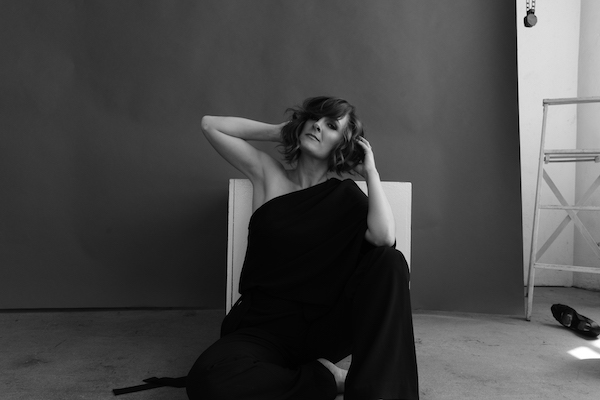Jan 13, 2026 2:09 PM
More Trump-Kennedy Center Cancellations
The fallout from the renaming of the John F. Kennedy Center for the Performing Arts to include President Donald…

Sara Gazarek delves into self-reflection for Thirsty Ghost.
(Photo: Shervin Lainez)Pain might not be pretty, but honesty is riveting.
Thirsty Ghost is an unabashed exploration of loss, heartache and, ultimately, healing. It represents a departure for vocalist Sara Gazarek, whose career began its ascent when she was a teenager singing with Wynton Marsalis at Avery Fisher Hall. It’s also the most exciting recording of her career.
About two decades after those dates with Marsalis, a series of personal challenges—divorce, a family health crisis, an intimate betrayal—caused Gazarek to re-examine not only her always-perky repertoire, but the way that she relates to her audience. DownBeat was on hand Aug. 10 when Gazarek debuted the album at New York’s Jazz Standard, and in an interview following the performance, she talked about the trauma that led her to chart a new artistic course.
The following has been edited for length and clarity.
On this record, you throw off your usually sunny musical persona and delve into the darker side of relationships. Why is this release different from your earlier albums?
With Thirsty Ghost I didn’t start with the goal of picking songs for an album, like I did for Yours or Blossom & Bee. Instead, over a four-year period I specifically chose songs to help me process things that were happening in my life. At the end of that four-year period there was a story with a beginning, middle and end.
This also was your first self-produced album. Why now?
I was thinking about what it means to have a producer. The role of a producer is to polish an album with their own brand of soap—to help pick the songs and the concept, see the project through to the end. But this album wasn’t a concept, it was my life, and I wondered if having a producer would prohibit my ability to actually express what it is I wanted to say. Because this record is the most personal that I’ve ever released, I wanted to be the only one in charge of the artistic decisions.
At your Jazz Standard concert, you talked about how Kurt Elling, who has supported you throughout your career, was the catalyst for the new focus in your work. How so?
Kurt pointed out to me that in my art, I was hiding from the things that I was going through personally. I was continuing to play into the idea that I was the ingénue in the dress, the girl who wanted to sing light love songs, smiling and making jokes, and introducing the band a hundred times. Hiding behind these things made me feel safe.
Did you have any concerns about your fans’ expectations?
I wondered how it was going to be received. Either [the audience] would be on board or not, but at that point, it was not an option. I couldn’t survive musically with the same agenda. My center—who I was as a person—had shifted so greatly, it had gotten to the point where it almost felt bad to be on stage singing about things that I wasn’t actually experiencing.
The material on the album cuts a wide swath, both musically and emotionally. How did you pull all of these contrasting tunes together into a cohesive whole?
Every song on the album is different, because each one came out of a different situation. They’re all birthed from the same place of wanting to heal something that I had experienced, but each followed a different process. And that process was rooted in trusting myself and trusting my colleagues.
You can really hear the grit on your version of Dolly Parton’s “Jolene.”
For this arrangement, I told [arranger Geoffrey Keezer] that I wanted to burn the house down and slash the tires. I wanted something more muscular, at a slower tempo, and with a more constant subdivision, so that it felt more driving. He came back with that arrangement, and it was perfect.

Belá Fleck during an interview with Fredrika Whitfield on CNN.
Jan 13, 2026 2:09 PM
The fallout from the renaming of the John F. Kennedy Center for the Performing Arts to include President Donald…

Peplowski first came to prominence in legacy swing bands, including the final iteration of the Benny Goodman Orchestra, before beginning a solo career in the late 1980s.
Feb 3, 2026 12:10 AM
Ken Peplowski, a clarinetist and tenor saxophonist who straddled the worlds of traditional and modern jazz, died Feb. 2…

The success of Oregon’s first album, 1971’s Music Of Another Present Era, allowed Towner to establish a solo career.
Jan 19, 2026 5:02 PM
Ralph Towner, a guitarist and composer who blended multiple genres, including jazz — and throughout them all remained…

Rico’s Anti-Microbial Instrument Swab
Jan 19, 2026 2:48 PM
With this year’s NAMM Show right around the corner, we can look forward to plenty of new and innovative instruments…

Richie Beirach was particularly renowned for his approach to chromatic harmony, which he used to improvise reharmonizations of originals and standards.
Jan 27, 2026 11:19 AM
Richie Beirach, a pianist and composer who channeled a knowledge of modern classical music into his jazz practice,…